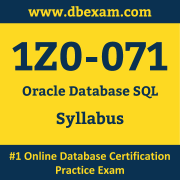 You can use this Oracle 1Z0-071 exam study guide to collect all the information about the Oracle Database SQL exam. The Oracle 1Z0-071 certification exam is mainly targeted to those candidates who have some experience or exposure to Oracle Database technology and want to flourish their career with Oracle Database SQL Certified Associate credential.
You can use this Oracle 1Z0-071 exam study guide to collect all the information about the Oracle Database SQL exam. The Oracle 1Z0-071 certification exam is mainly targeted to those candidates who have some experience or exposure to Oracle Database technology and want to flourish their career with Oracle Database SQL Certified Associate credential.
The Oracle 1Z0-071 certification exam validates your understanding of the Oracle Database technology and sets the stage for your future progression. Your preparation plan for Oracle Database SQL Certification exam should include hands-on practice or on-the-job experience performing the tasks described in following certification exam syllabus topics.
Oracle 1Z0-071 Exam Details:
| Exam Name | Oracle Database SQL |
| Exam Code | 1Z0-071 |
| Exam Price | USD $245 (Price may vary by country or by localized currency) |
| Duration | 120 minutes |
| Number of Questions | 63 |
| Passing Score | 63% |
| Format | Multiple Choice Questions (MCQ) |
| Recommended Training |
Earn the Oracle Database SQL Certified Associate Credential Technology Learning Subscription |
| Schedule Exam | Buy Oracle Training and Certification |
| Sample Questions | Oracle Database SQL Certified Associate |
| Recommended Practice | 1Z0-071 Online Practice Exam |
Oracle 1Z0-071 Syllabus Topics:
| Relational Database concepts |
- Explaining the theoretical and physical aspects of a relational database - Relating clauses in SQL Select Statement to Components of an ERD - Explaining the relationship between a database and SQL |
| Retrieving Data using the SQL SELECT Statement |
- Using Column aliases - Using The SQL SELECT statement - Using concatenation operator, literal character strings, alternative quote operator, and the DISTINCT keyword - Using Arithmetic expressions and NULL values in the SELECT statement |
| Restricting and Sorting Data |
- Applying Rules of precedence for operators in an expression - Limiting Rows Returned in a SQL Statement - Using Substitution Variables - Using the DEFINE and VERIFY commands - Sorting Data |
| Using Single-Row Functions to Customize Output |
- Manipulating strings with character functions in SQL SELECT and WHERE clauses - Performing arithmetic with date data - Manipulating numbers with the ROUND, TRUNC and MOD functions - Manipulating dates with the date function |
| Using Conversion Functions and Conditional Expressions |
- Applying the NVL, NULLIF, and COALESCE functions to data - Understanding implicit and explicit data type conversion - Using the TO_CHAR, TO_NUMBER, and TO_DATE conversion functions - Nesting multiple functions |
| Reporting Aggregated Data Using Group Functions |
- Restricting Group Results - Creating Groups of Data - Using Group Functions |
| Displaying Data from Multiple Tables |
- Using Self-joins - Using Various Types of Joins - Using Non equijoins - Using OUTER joins - Understanding and Using Cartesian Products |
| Using Subqueries to Solve Queries |
- Using Single Row Subqueries - Using Multiple Row Subqueries - Update and delete rows using correlated subqueries |
| Using SET Operators |
- Matching the SELECT statements - Using the ORDER BY clause in set operations - Using The INTERSECT operator - Using The MINUS operator - Using The UNION and UNION ALL operators |
| Managing Tables using DML statements |
- Managing Database Transactions - Controlling transactions - Perform Insert, Update and Delete operations - Performing multi table Inserts - Performing Merge statements |
| Managing Indexes Synonyms and Sequences |
- Managing Indexes - Managing Synonyms - Managing Sequences |
| Use DDL to manage tables and their relationships |
- Describing and Working with Tables - Describing and Working with Columns and Data Types - Creating tables - Dropping columns and setting column UNUSED - Truncating tables - Creating and using Temporary Tables - Creating and using external tables - Managing Constraints |
| Managing Views | - Managing Views |
| Controlling User Access |
- Differentiating system privileges from object privileges - Granting privileges on tables - Distinguishing between granting privileges and roles |
| Managing Objects with Data Dictionary Views | - Using data dictionary views |
| Managing Data in Different Time Zones |
- Working with CURRENT_DATE, CURRENT_TIMESTAMP,and LOCALTIMESTAMP - Working with INTERVAL data types |
The Oracle Database SQL Certification Program certifies candidates on skills and knowledge related to Oracle Database products and technologies. The Oracle 1Z0-071 is granted based on a combination of passing exams, training, and performance-based assignments, depending on the level of certification. Oracle Database SQL certification is a real benchmark of experience and expertise that helps you stand out in a crowd among employers. To ensure success, Oracle recommends combining education courses, practice exams, and hands-on experience to prepare for your Oracle Database SQL Certified Associate certification exam as questions will test your ability to apply the knowledge you have gained in hands-on practice or professional experience.
